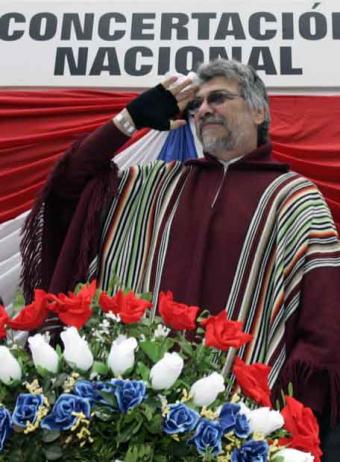Paraguay
Paraguay: Coup at heart of struggle over Latin America

By Federico Fuentes
July 15, 2012 -- Green Left Weekly -- The June 22 coup carried out against Paraguayan President Fernando Lugo was an important blow to progressive movements across Latin America. The struggle against the coup is far from over, but learning the lessons of it are important. This requires placing the coup in the context of the turbulent process of change occurring in Latin America
Latin America is in a period of transition. It is characterised, on the one hand, by the decline of the United States' influence. This is particularly the case with the unravelling of the neoliberal model implanted that was more firmly implanted more firmly in Latin America in the 1980s and 1990s than in any other region of the South.
On the other hand, left and progressive forces have made significant advances, including winning government in some cases. This has been accompanied by a growing process of political and economic integration of the region.
Rise of the new left
False food choices under capitalism

Below is the editorial of the Socialist WebZine, online
Paraguay: Change is still to come; The first year of Fernando Lugo’s government

By Adolfo Giméne, translated by Federico Fuentes for Links International Journal of Socialist Renewal
August 14, 2009 – Asunción -- The anniversary of the first year of Fernando Lugo’s government coincided with a five-day national protest (August 10-15) organised by the United Popular Space (Espacio Unitario Popular, EUP), a coming together of many social organisations and left parties [1], with the support of figures from diverse political sectors, including the governor of the department of San Pedro, Jose Pakova Ledesma, from the Authentic Radical Liberal Party (Partido Liberal Radical Auténtico, PLRA). [Lugo was elected president on April 20, 2008, but did not formally take office until August 15.]
World Social Forum returns to Brazil, marks Latin America's `swing to the left'
By Marc Becker
February 5, 2009 -- After an absence of four years, the World Social Forum (WSF) returned to Brazil during the last week of January 2009. More than 100,000 people descended on the city of Belem at the mouth of the mighty Amazon River to debate proposals and plan strategies for making a new and better world.
The forum first met in the southern Brazilian city of Porto Alegre in 2001 as a gathering of social movements dedicated to fighting neoliberalism and militarism. Nine years later, Latin America has shifted significantly to the left, and the forum has played an important role in that process.
The forum began on January 27, 2009, as all of the forums have, with a massive march through the streets of Belem. The theme of the march was from Africa, where the last unified forum was held in Nairobi, Kenya, in
2007, to the Amazon. A drenching tropical rain momentarily stalled the planned events. The march concluded with a massive rally featuring speeches and music.
Latin America's struggle for integration and independence
Caracas, July 26, 2008 -- Commenting on how much the two had in common — same age, three children, similar music tastes — Ecuadorian President Rafael Correa said to Mexican President Felipe Calderon on April 11 that “perhaps we represent the new generation of leaders in Latin America”. He added, however, that one difference still remained: Calderon had still not become a socialist. “Being right wing is out of fashion in Latin America … Join us, you are always welcome.”
The election of Fernando Lugo as Paraguayan president seems to confirm the idea of a new fashion for presidents. The former priest joins the ranks of current Latin American presidents that includes two women (Cristina Fernandez de Kirchner in Argentina and Michelle Bachelet in Chile), an indigenous person (Evo Morales in Bolivia), a former militant trade unionist (Lula da Silva in Brazil), a radically minded economist (Rafael Correa in Ecuador), a doctor (Tabare Vasquez in Uruguay), a former guerrilla fighter (Daniel Ortega in Nicaragua) and a former rebel soldier (Hugo Chavez in Venezuela).
XIV Sao Paulo Forum: Left parties debate the current historic conjuncture
By Inés Hayes, with reports from Montevideo by Cristina Camusso and Julio Louis.
